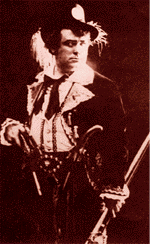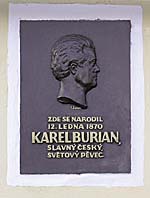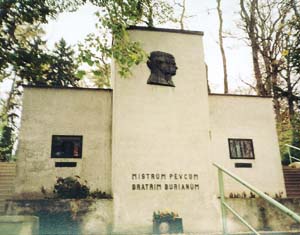
Autobiography
Memoirs (excerpts)
Brno – the first conductor
Estonia – Reval (Tallin today)
Leipzig – Staegemann
Three seasons on Rhine
Hannover – Hamburg
GALERIE
Recordings, Photos

12.1.1870 Rousínov by Rakovník – 25.9.1924 Senomaty, his mother country
In the world known as Carl (Karl) Burrian


He was one of the greatest singers of his time, a true-hearted hero both on stage and in life. He sang at the Royal Opera in Dresden, at the Grand Opera in Paris, at the Covent Garden and the Metropolitan, and everywhere he won the recognition and admiration of the audience, composers and conductors. He played a part of the first Herodes in Strauss’ Salome, Parsifal in Bayreuth and was sought after for their plays by Ernest von Schuch, Hans Richter, Gustav Mahler or Arturo Toscanini, who considered him the most rhythmical singer in the world. In France, he was honored a Knight of Honorary Legion, became a Royal Chamber Singer in Saxony, Würtemberg and Bavaria, and won the “King of the Singers” title in the great contest of the best singers in Paris.
Karel Burian mastered a perfect technique and soulful expression that was brilliant even without the effusiveness typical for the Italian singers, together with his flawless German and Czech pronunciation (he could also sing in French, Italian, and Hungarian). Paradoxically, he was hampered by the difficult repertoire that was centered around Siegfried, Tristan, and Tannhäuser, that is “ineffective” Wagnerian roles that were still to be promoted in his time. However, he succeeded to infuse these mythological figures with his own hot blood and breathed new life into them as can rarely be seen or heard up to this day. His conception was nonetheless unique and original in his own time. He was also an excellent interpreter of Smetana and thus we can only regret, as his contemporaries did, that he never appeared together with Emma Destinová on the stage of the National Theatre in Prague (unlike in Berlin or Paris).
 The Czech musical tradition was mostly influenced by his vocal recitals. The National Theatre turned him down at the beginning of his carrier, and similarly he was ousted from several other shorter contracts and guest undertakings. The majority of the Czech critiques also rejected him, mostly because of his “singing to Germans.” However, it was rather his open telling to the Czech patriots what he really thought of them what mattered and also the fact that Burian cared more for his artistic independence than for his good name in Czech public life, full of petty intrigues. Nevertheless, one has to admit that his haughty canceling of performances in the last moment professionally harmed him more.
The Czech musical tradition was mostly influenced by his vocal recitals. The National Theatre turned him down at the beginning of his carrier, and similarly he was ousted from several other shorter contracts and guest undertakings. The majority of the Czech critiques also rejected him, mostly because of his “singing to Germans.” However, it was rather his open telling to the Czech patriots what he really thought of them what mattered and also the fact that Burian cared more for his artistic independence than for his good name in Czech public life, full of petty intrigues. Nevertheless, one has to admit that his haughty canceling of performances in the last moment professionally harmed him more.
It is a miracle that two figures of such quality as Burian and Emmy Destinn appeared in this country at the same time. These two cosmopolitans never forgot that they come from Bohemia, where they both returned to but were in turn not allowed even to teach at the conservatory.
 When Burian died, the National Theatre did not display his coffin, only a torn black flag was hung out at the back wing. The Czech Philharmonic Orchestra played the funeral music from the Dawn of the Gods – the first Czech heroic tenor died.
When Burian died, the National Theatre did not display his coffin, only a torn black flag was hung out at the back wing. The Czech Philharmonic Orchestra played the funeral music from the Dawn of the Gods – the first Czech heroic tenor died.
“Karel Burian was singing as a guest at the German New Theatre of Prague. A few days later I was at Dr. Franz Wien-Claudi’s, at his palace in Jindřišská. He was raving about Burian’s performance. I asked him what he thinks of Caruso in comparison to Burian. He replied: ‘Wo bleibt der Caruso!’”
Karel Weiss, composer
With Burian as young Siegfried, a young man with profuse voice-power appears on the stage. From the first tone until the very last, his voice shows so much of pithy plenitude, broad robustness, bright splendor, as if one heard something superhuman. His art is so deliberate and passionate. And what tones he can produce! There is none that would not have the right timbre, we hear no forte that would not be beautifully polished and elegant…
Gustav Mahler
Photo: Plaque in Karel Burian's native place (left), brothers' Karel and Emil Burian memorial at the Rakovník's cemetery
Literature: Burian K.: Paměti (Smetana, Praha, ročníky 1911 - 1912); Hradčanský J. V.: Komorní pěvec Karel Burian ve svých veršovaných dopisech (Graf. ústav L. Beneše, Český Brod, 193?); Hradčanský J. V.: Komorní pěvec Karel Burian ve svých veršovaných dopisech (Fr. A. Urbánek a synové, Praha, 1933); Burian E. F.: Karel Burian (Praha 1948); Novotný A.: Pěvecký portrét (Supraphon, Praha 1974); Wenig J.: Ema Destinová - Karel Burian (Supraphon, Praha, 1960); Nejedlý Z.: Dějiny opery Národního divadla I.-II. (Praha, 1949); Rektorys A.: Naši operní pěvci, (Praha 1958); Černý J.: Osmý den (Reflex, Praha, 6. 3. 2003)
Realisation: Boris Klepal, translation: Petra Mutlová
Thanks to Miloš Klepal and Alena Švecová.
Questions, Informatios, Responses